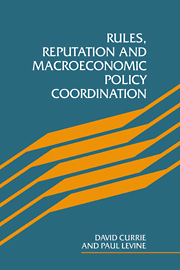Book contents
- Frontmatter
- Contents
- Acknowledgements
- Introduction
- Part I General issues
- Part II Theory and methodology
- Part III Fiscal and monetary policy in interdependent economies
- 8 Macroeconomic policy design in an interdependent world
- 9 Does international macroeconomic policy coordination pay and is it sustainable?: a two-country analysis
- 10 International cooperation and reputation in an empirical two-bloc model
- 11 Fiscal policy coordination, inflation and reputation in a natural rate world
- 12 The use of simple rules for international policy coordination
- 13 Evaluating the extended target zone proposal for the G3
- Bibliography
- Index
9 - Does international macroeconomic policy coordination pay and is it sustainable?: a two-country analysis
Published online by Cambridge University Press: 03 December 2009
- Frontmatter
- Contents
- Acknowledgements
- Introduction
- Part I General issues
- Part II Theory and methodology
- Part III Fiscal and monetary policy in interdependent economies
- 8 Macroeconomic policy design in an interdependent world
- 9 Does international macroeconomic policy coordination pay and is it sustainable?: a two-country analysis
- 10 International cooperation and reputation in an empirical two-bloc model
- 11 Fiscal policy coordination, inflation and reputation in a natural rate world
- 12 The use of simple rules for international policy coordination
- 13 Evaluating the extended target zone proposal for the G3
- Bibliography
- Index
Summary
Introduction
The purpose of this chapter is to investigate the benefits and the sustaina-bility of cooperation in the conduct of macroeconomic policy in the international economy. Recent work has highlighted the significant externalities between countries in the effects of policy particularly those arising through policy-induced exchange-rate changes in a regime of floating rates. Thus Taylor (1985) finds that non-cooperative policy design results in an overactive use of monetary policy, relative to the cooperative case, as countries use tight monetary policy to induce exchange-rate appreciation as part of an anti-inflationary package. This is true even if the real exchange rate must subsequently depreciate again, adding to inflationary pressures later on, for the pattern of real exchange-rate appreciation and subsequent depreciation acts to redistribute inflation optimally through time, smoothing peaks and troughs. Currie and Levine (1985a, 1985b) obtain similar findings for monetary policy, and report also the incentive for individual governments to offset the output consequences of the resulting loss of competitiveness by means of expansionary fiscal policy. The consequent combination of tight money and expansionary fiscal policy is severely sub-optimal for the system taken as a whole, and therefore for all individual countries if such policies are adopted generally, and, if adhered to, are found in some circum'stances to be wholly destabilising.
These findings that international cooperation in macroeconomic policy is beneficial are at odds with other findings, notably by Oudiz and Sachs (1985), Miller and Salmon (1985b) and Rogoff (1985), that the benefits of cooperation may be limited or even absent.
- Type
- Chapter
- Information
- Rules, Reputation and Macroeconomic Policy Coordination , pp. 247 - 287Publisher: Cambridge University PressPrint publication year: 1993



